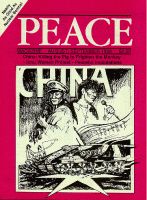
Peace Magazine Aug-Sep 1989, page 7. Some rights reserved.
Search for other articles by Hans Sinn here
After forty years, a West German Chancellor is starting to see the risks of the weapons on German soil.
Despite NATO's Brussels compromise of May 30 on the modernization of short range nuclear weapons, the dispute is far from over. Threatened with electoral defeat by a coalition of Social Democrats (SDP), and Greens, Chancellor Helmut Kohl wants to remove such missiles from West Germany.
Still, the challenge forcing Kohl to resist his NATO partners comes, not from the SPD or Greens, but from his own disaffected right wing. Former backers of the ruling Christian Democratic Union (CDU) and Free Democratic Party (FDP) coalition are voting in droves for the new Republican Party, which has toppled CDU/FDP coalition governments in Berlin and Hessen with the slogan, "Germans First!".
The new party (whose leader, Franz Schoenhuber, "is proud to have been an SS man") appeals to lower middle- and working-class voters. Feeling left out of the economy, they resent the Germans who are being repatriated from Poland and the USSR and given preferential access to jobs and housing. Republican voters dread West Germany's integration into the European Economic Community (EEC). When national barriers come down in 1992, Germans will vie with the EEC's 15 million free-floating unemployed for jobs. The Republicans see the CDU/FDP as more interested in creating a cheap multinational labor pool and new markets than in caring for its German-born citizens.
In Berlin the FDP won too few votes to be represented in parliament. Foreign Minister Hans-Friedrich Genscher (FDP), facing political extinction, is urging his coalition partner, Helmut Kohl, to play up German interests to take the wind out of the Republican sails. Genscher is suddenly noticing that local nuclear missiles are aimed at both East and West Germans.
The British and Americans are puzzled by this sudden display of German "national interests." Previous governments welcomed NATO nuclear weapons and troops on West German soil. The prospect of Canada's withdrawing its troops in 1985 brought the German Defence Minister almost to apoplexy. (See PEACE, April/May 1989, p. 19.) The only Germans resisting NATO's strategy and nuclear arsenals have been the Greens. Why, then, does Kohl now question NATO? Margaret Thatcher, visiting the FRG in April, lectured him that a German refusal to share the nuclear risk will cause the Americans to withdraw their troops from Europe. Like Churchill in 1943, the Iron Lady expects American withdrawal to lead to Soviet rule of Europe.
True, the Americans, exasperated by the ambivalence of their German friends, warn that they might withdraw, should the West German policy lead to a denuclearization of Europe. The U.S. will not bear the risk of deterrence alone. Congressman Les Aspin, Chairman of the Armed Forces Committee, puts it bluntly, "No nukes, no troops."
But the replacement of Lance missiles is a minor aspect of the total issue. In West Germany ( a quarter of the size of Ontario) there are 4000 nuclear weapons and 1,500,000 troops from six foreign countries. And after forty years, a West German Chancellor is starting to see the risks of the weapons on German soil - which previous governments and voters ignored. Kohl took note of the 1989 NATO exercise "Wintex," which showed that a Warsaw Pact invasion of Western Europe can be stopped by the use of short range nuclear missiles without the long range arsenals of the U. S., Britain, and France. The price for such defence of the West would be the destruction of the two Germanies, Poland, Hungary and Turkey. This is nothing new, but suddenly a German leader finds it "completely insane."
The West German press is picking up the theme. Not only Green-leaning papers, but prestigious ones such as Die Zeit (May 12) quote Mrs. Thatcher as saying, "Why shouldn't the Germans have these weapons on their soil? After all, they lost the last World War." Die Zeit also questioned the purpose of foreign troops on German soil: "Are they here to protect us or to occupy us?"
Germans are examining their options outside NATO and Warsaw Pact. Die Welt (March 22) wrote that a neutral German buffer state might serve the interest of peace and European unity better than a divided Germany.
German-Soviet alliance seems more likely than the Soviet domination of Western Europe. Writes A.M. Rosenthal, in the New York Times, "The Federal Republic, already the leading economic country in Western Europe, wants to use Gorbachev's policy of glasnost to assume economic/political leadership also in East and Central Europe. German monies and technology will flow into the Soviet Union and lead to an economic as well as political alliance between the two countries. The chasm between Bonn and East-Berlin will close; both German halves demand reunification; both can call upon their own strength and Soviet support."
Hans Sinn is a civilian defence activist.

Peace Magazine Aug-Sep 1989, page 7. Some rights reserved.
Search for other articles by Hans Sinn here